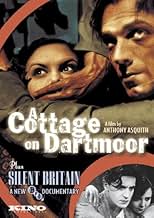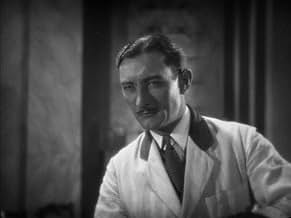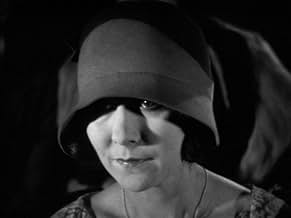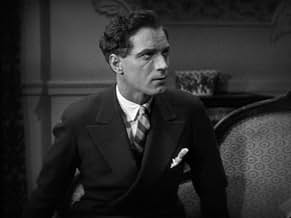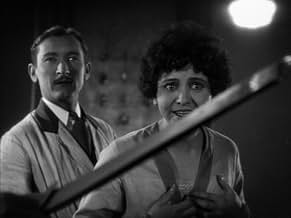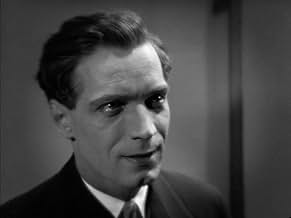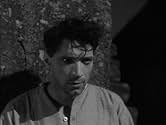A Cottage on Dartmoor
- 1930
- 1 Std. 28 Min.
IMDb-BEWERTUNG
7,5/10
1292
IHRE BEWERTUNG
Füge eine Handlung in deiner Sprache hinzuA former barber escapes from a high security prison. Flashback story of an escape from the lonely, high-security Dartmoor Prison.A former barber escapes from a high security prison. Flashback story of an escape from the lonely, high-security Dartmoor Prison.A former barber escapes from a high security prison. Flashback story of an escape from the lonely, high-security Dartmoor Prison.
- Regie
- Drehbuch
- Hauptbesetzung
Hans Adalbert Schlettow
- Harry - a Dartmoor Farmer
- (as Hans Schlettow)
Anthony Asquith
- Bespectacled Man in Cinema
- (Nicht genannt)
Judd Green
- Customer
- (Nicht genannt)
Empfohlene Bewertungen
First time of viewing this one: a marvellous experience, from the opening shots of a prisoner on the run over moorland from prison guards to the ending where
The first intertitle is "Joe!" and we're immediately launched into an hour long flashback of how Joe got to be a prisoner and how he knows Sally. He's obsessively in love with her with awful consequences for the man she really loves, and himself - realistically portrayed and apart from the incident in the barbers unfortunately only too believable. The three main leads play their parts wonderfully well with incessant close ups, inventive photography, low cameras and precise mirror shots highlighting the intensity. Photogenic Norah Baring thankfully was no Hollywood Queen, her self possession and simple youthful homeliness adding an extra dimension to the time honoured tale. Favourite bits: Life in Sally's boarding house with the old biddies, ear trumpets and ancient furniture and plants; The cinema segment with everyone including the redundant pit orchestra intently watching a talkie, and of course the orgasmic psycho-jazz snappy editing; The "murder" in the barbers (it was fun watching everybody apparently just watching the dying man dying).
One of the last mainstream silent films produced, it just couldn't have worked even one year later as a slave to the voice this shows exactly what silent films could offer as an artform, and still do to those with a little patience. Try it.
The first intertitle is "Joe!" and we're immediately launched into an hour long flashback of how Joe got to be a prisoner and how he knows Sally. He's obsessively in love with her with awful consequences for the man she really loves, and himself - realistically portrayed and apart from the incident in the barbers unfortunately only too believable. The three main leads play their parts wonderfully well with incessant close ups, inventive photography, low cameras and precise mirror shots highlighting the intensity. Photogenic Norah Baring thankfully was no Hollywood Queen, her self possession and simple youthful homeliness adding an extra dimension to the time honoured tale. Favourite bits: Life in Sally's boarding house with the old biddies, ear trumpets and ancient furniture and plants; The cinema segment with everyone including the redundant pit orchestra intently watching a talkie, and of course the orgasmic psycho-jazz snappy editing; The "murder" in the barbers (it was fun watching everybody apparently just watching the dying man dying).
One of the last mainstream silent films produced, it just couldn't have worked even one year later as a slave to the voice this shows exactly what silent films could offer as an artform, and still do to those with a little patience. Try it.
COTTAGE ON DARTMOOR: an expressionistic and claustrophobic account of sexual obsession and jealousy, very Hitchockian in the way it deals with the resulting crescendo of suspense, especially in connection with a key throat-cutting in a barber's chair incident. Asquith was a director who grew stodgy as his career entered into the sound era, viz his terribly British adaptions of Rattigan, but the present film (1929) is rather an eye opener. One standout scene is set within a cinema, partly a comment on the imminent and creatively burdensome coming of clunky sound, and which contains an extended eye opening use of editing, cutting about within an audience as the beady-eyed boy friend watches his victims - a bravura sequence which ought to be much better known to cineastes.
From time to time, it is very laudable for this German count to re-watch some of those silent films of his aristocratic youth. Overall, this in order to check if the passage of time has positively or negatively influenced his recollection of the remarkable aspects of such films. That's not to mention that fortunately many of those films after such long time are now cleaned and restored -- nothing in common with those rotten and blurred nitrates that are stored at this Herr Graf's gloomy cellar that necessarily need an extra pair of monocles each time that they are shown at the Schloss theatre.
This time such advisable aristocratic and nostalgic film habits had excellent artistic results. That's because after 70 years from its official release, "A Cottage On Dartmoor", a film directed by Herr Anthony Asquith, preserves intact its many and excellent virtues. The perfect word that summarizes the merits of that British film: virtuosity.
Herr Anthony Asquith skillful film direction begins as the films starts. It introduces a convict that escaped from prison running away along Dartmoor meadows. With the sole purpose of revenge, he tries to find the girl that causes him imprisonment; when finally he finds her, a fascinating flashback starts.
A superb display of film technique can be seen in the film. There are such as perfect images ( Expressionism influences are obvious in the film, in its obscure and visual conception ) concatenations or fascinating visual metaphors ( the use of the camera is astounding: remarkable and imaginative camera angles that scrutinizes the tormented soul and evil intentions of the main character of the film ). It depicts an intriguing, thrilling and original story. A barber, Joe ( Herr Uno Henning ) falls in love with a manicurist, Sally ( Dame Norah Baring ) in the same place where both work. Joe is rejected by her and doesn't accept that ultimately Sally loves a client, Harry ( Herr Hans Adalbert Schlettow ). Consumed by jealousy, tries to murder Harry.
It has a perfect "tempo" in order to explain and show such a tormented love story that will finish with a poetic, sorrowful ending. Only one thing is lacking in seeing the film and is Dame Norah Baring's performance. Probably she is so stiff, inexpressive and frigid due to the abuse of the use of tea -- that awful beverage that usually is drunk by commoners and even eccentric aristocrats in the perfidious Albion. But that's a minor flaw that doesn't damage excessively the excellent artistic merits of such remarkable film.
And now, if you'll allow me, I must temporarily take my leave because this German Count must go to a decadent soirée pretty well-combed.
Herr Graf Ferdinand Von Galitzien http://ferdinandvongalitzien.blogspot.com/
This time such advisable aristocratic and nostalgic film habits had excellent artistic results. That's because after 70 years from its official release, "A Cottage On Dartmoor", a film directed by Herr Anthony Asquith, preserves intact its many and excellent virtues. The perfect word that summarizes the merits of that British film: virtuosity.
Herr Anthony Asquith skillful film direction begins as the films starts. It introduces a convict that escaped from prison running away along Dartmoor meadows. With the sole purpose of revenge, he tries to find the girl that causes him imprisonment; when finally he finds her, a fascinating flashback starts.
A superb display of film technique can be seen in the film. There are such as perfect images ( Expressionism influences are obvious in the film, in its obscure and visual conception ) concatenations or fascinating visual metaphors ( the use of the camera is astounding: remarkable and imaginative camera angles that scrutinizes the tormented soul and evil intentions of the main character of the film ). It depicts an intriguing, thrilling and original story. A barber, Joe ( Herr Uno Henning ) falls in love with a manicurist, Sally ( Dame Norah Baring ) in the same place where both work. Joe is rejected by her and doesn't accept that ultimately Sally loves a client, Harry ( Herr Hans Adalbert Schlettow ). Consumed by jealousy, tries to murder Harry.
It has a perfect "tempo" in order to explain and show such a tormented love story that will finish with a poetic, sorrowful ending. Only one thing is lacking in seeing the film and is Dame Norah Baring's performance. Probably she is so stiff, inexpressive and frigid due to the abuse of the use of tea -- that awful beverage that usually is drunk by commoners and even eccentric aristocrats in the perfidious Albion. But that's a minor flaw that doesn't damage excessively the excellent artistic merits of such remarkable film.
And now, if you'll allow me, I must temporarily take my leave because this German Count must go to a decadent soirée pretty well-combed.
Herr Graf Ferdinand Von Galitzien http://ferdinandvongalitzien.blogspot.com/
I'm extremely impressed with every aspect of 'A Cottage on Dartmoor', directed by the underrated Anthony Asquith (son of the Prime Minister). The camera-work features some superb tracking shots, kept perfectly in focus by focus-puller Arthur Woods (later a brilliant director in his own right, all too briefly before his death in World War Two). There is a clever and subtle flashback transition. The frame compositions are excellent, as are the performances by this obscure cast. At the climax of this monochrome film, there is a single flash of red: Hitchcock would later use this same device in 'Spellbound'. I wonder if Hitchcock copied it from Asquith.
Most of this story takes place in flashback, a device which I normally dislike. Flashbacks are now so hackneyed that there is an entire cinematic grammar of flashbacks: the screen goes blurry, the soundtrack swells with theremin music. Here, the transition to flashback is done subtly, with the first dialogue intertitle bridging the shift. Well done!
Some minor details distressed me. We see a prisoner who escaped from Dartmoor. His uniform displays a number, but shouldn't it also have the broad arrow? Also, since Joe (the convict) has sworn revenge against Harry Stevens -- his rival for the affection of Sally -- why ever have Harry and Sally moved to a remote cottage on Dartmoor, conveniently close to Joe's prison? This is the sort of thing which Hitchcock identified as 'icebox logic', the cinematic equivalent of "esprit d'escalier".
This film was made at an awkward moment of cinema history. The movie is silent, yet (in the dialogue titles) the characters on screen discuss going to 'a talkie'. But when they go to the cinema, a live orchestra are playing ... which indicates that the movie being shown is a silent. And an insert shot of a programme book tells us that the movie is Harold Lloyd's 'Safety Last', definitely a silent.
Not the least of this film's pleasures is its depiction of life in George V's England. I got a twinge of nostalgia from a brief shot of an infant clutching a rusk. (Do modern babies eat rusks?) In the central role, Norah Baring is excellent: portraying a simple manicurist, she is personable and pleasant to look at, without the implausible amount of glamour that a Hollywood actress would have brought to such a workaday role. I'll rate this fine character drama 8 out of 10.
Most of this story takes place in flashback, a device which I normally dislike. Flashbacks are now so hackneyed that there is an entire cinematic grammar of flashbacks: the screen goes blurry, the soundtrack swells with theremin music. Here, the transition to flashback is done subtly, with the first dialogue intertitle bridging the shift. Well done!
Some minor details distressed me. We see a prisoner who escaped from Dartmoor. His uniform displays a number, but shouldn't it also have the broad arrow? Also, since Joe (the convict) has sworn revenge against Harry Stevens -- his rival for the affection of Sally -- why ever have Harry and Sally moved to a remote cottage on Dartmoor, conveniently close to Joe's prison? This is the sort of thing which Hitchcock identified as 'icebox logic', the cinematic equivalent of "esprit d'escalier".
This film was made at an awkward moment of cinema history. The movie is silent, yet (in the dialogue titles) the characters on screen discuss going to 'a talkie'. But when they go to the cinema, a live orchestra are playing ... which indicates that the movie being shown is a silent. And an insert shot of a programme book tells us that the movie is Harold Lloyd's 'Safety Last', definitely a silent.
Not the least of this film's pleasures is its depiction of life in George V's England. I got a twinge of nostalgia from a brief shot of an infant clutching a rusk. (Do modern babies eat rusks?) In the central role, Norah Baring is excellent: portraying a simple manicurist, she is personable and pleasant to look at, without the implausible amount of glamour that a Hollywood actress would have brought to such a workaday role. I'll rate this fine character drama 8 out of 10.
10sunlily
A Cottage on Dartmoor is a late British silent of stunning clarity and poetic justice. The use of the camera to caress the homey accents in Norah's boarding house, the use of mirrors to dramatize the lives and thoughts of the characters, the elongated camera angles of the escaped convict jumping from captivity to freedom, and running from his past into redemption. All of this and more make this late silent itself almost a valentine to the end of the silent era and the dawn of sound.
One of the most poignant scenes in the movie demonstrates this by taking us to a "talkie" that nonetheless has a full orchestra that the camera hones in on and romanticizes.
While this is a tale of obsession, it is also a story of love that has many emotionally tense elements that Norah Baring and Uno Henning handle with dignity and grace. I'm very surprised that I've not heard more about either of these actors.
A Cottage on Dartmoor is a very beautifully realized film that probably wouldn't have been as effective had it been made as a sound movie.
One of the most poignant scenes in the movie demonstrates this by taking us to a "talkie" that nonetheless has a full orchestra that the camera hones in on and romanticizes.
While this is a tale of obsession, it is also a story of love that has many emotionally tense elements that Norah Baring and Uno Henning handle with dignity and grace. I'm very surprised that I've not heard more about either of these actors.
A Cottage on Dartmoor is a very beautifully realized film that probably wouldn't have been as effective had it been made as a sound movie.
Wusstest du schon
- PatzerJoe's coworker reaches down to pick up the movie tickets with his right hand, but the close-up shows his left hand grabbing them.
- VerbindungenFeatured in Kino Europa - Die Kunst der bewegten Bilder (1995)
Top-Auswahl
Melde dich zum Bewerten an und greife auf die Watchlist für personalisierte Empfehlungen zu.
Details
- Laufzeit1 Stunde 28 Minuten
- Farbe
- Sound-Mix
- Seitenverhältnis
- 1.20 : 1
Zu dieser Seite beitragen
Bearbeitung vorschlagen oder fehlenden Inhalt hinzufügen

Oberste Lücke
By what name was A Cottage on Dartmoor (1930) officially released in Canada in English?
Antwort
